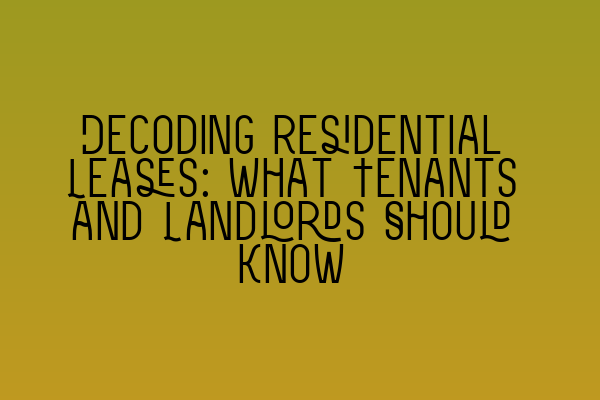Decoding Residential Leases: What Tenants and Landlords Should Know
Residential leases play a crucial role in the rental market and are essential documents that govern the relationship between tenants and landlords. Whether you are a tenant looking to rent a property or a landlord seeking to lease your property, it is vital to have a clear understanding of residential leases to avoid future complications and disputes.
What is a Residential Lease?
A residential lease, also known as a rental agreement or tenancy agreement, is a legally binding contract between a landlord and a tenant. It outlines the terms and conditions of the rental arrangement, including the rights, obligations, and responsibilities of both parties.
Residential leases typically cover various aspects, such as:
- Rental period: The duration for which the tenancy agreement is valid, whether it’s a fixed-term lease or a month-to-month tenancy.
- Rent amount: The agreed-upon monthly rent and the date it is due.
- Security deposit: The amount of money paid by the tenant as security against damages or unpaid rent.
- Utilities and other expenses: Whether the tenant or the landlord is responsible for paying utilities, maintenance fees, or other charges.
- Use of the property: Any restrictions on the tenant’s activities and the maintenance of the property.
- Termination conditions: The conditions under which either party can terminate the lease, such as giving notice or breach of contract.
Understanding these key aspects of a residential lease is crucial for both tenants and landlords to ensure a harmonious and legally compliant rental relationship.
Tenant’s Rights and Obligations
Tenants have specific rights and obligations outlined in the residential lease. Here are some of the essential rights tenants should be aware of:
Right to exclusive possession
The tenant has the right to exclusive possession of the rented property during the lease term, as long as they comply with the lease terms and pay the rent on time. This means that the landlord cannot enter the property without the tenant’s permission, except in certain circumstances specified by law.
Right to habitable premises
The landlord is responsible for ensuring that the rental property is in a habitable condition, meeting basic health and safety standards. This includes providing adequate heating, plumbing, and electricity, as well as addressing any necessary repairs or maintenance.
Obligation to pay rent
Tenants are legally obligated to pay the agreed-upon rent on time and in the manner specified in the lease. Failure to pay rent can result in eviction and legal consequences.
Obligation to maintain cleanliness
Tenants are responsible for keeping the rental property clean and sanitary, and they must ensure that they do not cause any damage beyond normal wear and tear.
Right to privacy
Tenants have the right to privacy and should not be subjected to unnecessary or intrusive inspections or surveillance by the landlord.
Landlord’s Rights and Obligations
Landlords also have specific rights and obligations that they must adhere to during the tenancy. Here are some key points that landlords should keep in mind:
Right to receive rent
Landlords have the right to receive the agreed-upon rent amount on time and in the manner specified in the lease. They also have the right to increase the rent in accordance with local laws and regulations.
Obligation to maintain the property
Landlords are responsible for maintaining the rental property and ensuring that it meets the required health and safety standards. This includes addressing repairs and maintenance promptly.
Right to access the property
Landlords have the right to access the rental property to carry out necessary inspections, repairs, or show the property to potential tenants, but they must provide reasonable notice and obtain the tenant’s consent.
Obligation to return the security deposit
When the tenant moves out, the landlord is responsible for returning the security deposit within a specified timeframe, after deducting any legitimate charges for unpaid rent or damages beyond normal wear and tear.
Resolving Disputes
Despite the best efforts of tenants and landlords to maintain a smooth rental relationship, disagreements and disputes may arise. It is crucial to handle these disputes in a fair and legal manner to avoid further complications.
Residential leases often include clauses regarding dispute resolution, such as mediation or arbitration processes. These methods allow both parties to resolve their conflicts without resorting to costly and time-consuming court proceedings.
However, if the dispute cannot be resolved through alternative methods, seeking legal advice from a property law solicitor is recommended. They can guide you through the relevant laws and help you protect your rights or negotiate a fair settlement.
Conclusion
Residential leases form the foundation of the tenant-landlord relationship, providing clarity on rights, obligations, and responsibilities. Both tenants and landlords should carefully read and understand the terms of the lease before signing it to avoid any misunderstandings or disputes down the line. If in doubt, consulting with a property law solicitor can provide valuable insights and ensure a smooth rental experience.
Related Articles:
SQE Contract Law: Analyzing Landmark Cases and Influential Judicial Decisions
Understanding Contractual Capacity: Rights and Limitations
Interactive SQE Mock Tests for Contract Law: Test Your Knowledge
Join Our SQE Contract Law Webinars: Expert Insights and Guidance
SQE Prep: Mastering the Essentials of Contract Law
